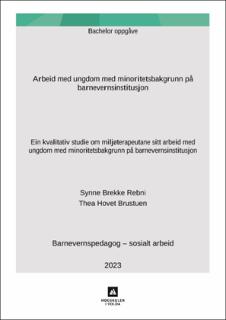Arbeid med ungdom med minoritetsbakgrunn på barnevernsinstitusjon. Ein kvalitativ studie om miljøterapeutane sitt arbeid med ungdom med minoritetsbakgrunn på barnevernsinstitusjon
Bachelor thesis
Permanent lenke
https://hdl.handle.net/11250/3078583Utgivelsesdato
2023Metadata
Vis full innførselSamlinger
Sammendrag
Denne oppgåva tar for seg ulike metodar som blir brukt i møte med ungdom som bur på barnevernsinstitusjonar. Det handlar også om korleis kultur påverkar dei profesjonelle si yrkesutøving og kva betydning kunnskap og forståing kan ha for kvaliteten på arbeidet. Problemstillinga er derfor; korleis arbeidar miljøterapeutar med ungdom med minoritetsbakgrunn på barnevernsinstitusjon. Dette er ein empirisk studie der vi har gjennomført dybdeintervju. Vi har brukt teori som omhandlar sentrale metodar innanfor institusjonsarbeid, og forskning om kulturforståing og kunnskap knytt til etniske minoritetar. Studien illustrerar at yrkesutøvarane ikkje har hatt så mykje erfaring med ungdommar med minoritetsbakgrunn. Ut ifrå den kunnskapen dei sit på, har dei tilnærma seg alle likt og tilrettelagt ut ifrå kvar enkelt individ. Noko dei har lagt merke til er at det å samarbeide er svært sentralt i møte med familiar med anna etnisk bakgrunn, då mykje er ukjent og framandt innanfor denne arenaen. Eit anna sentralt funn var at yrkesutøvarane erkjenne at det fortsatt er mykje kunnskap å hente og at dei dermed kan utøve eit betre arbeid overfor ungdommane. Vi kan altså konkludere med at meir fokus og kompetanse rundt temaet er eit forløp mot eit meir kultursensitivt arbeid. Abstract
This task covers various methods used when working with youth living in child welfare institutions. It also explores how culture influences the professional practice of workers and the importance of knowledge and understanding for the quality of their work. The question for our research is: how do social therapists work with youth of minority background in child welfare institutions? This is an empirical study where in-depth interviews have been conducted. The theory used encompasses central methods in institutional work and research on cultural understanding and knowledge related to ethnic minorities. The study shows that practitioners haven`t had much experience with youth of minority background. Based on the knowledge, they have approached everyone in a similar way and adapted to each individual. They have noticed that collaboration is essential when working with families of different ethnic backgrounds, since a lot is unknown and unfamiliar in this arena. Another key finding was that practitioners acknowledge that there is still a lot of knowledge to be gained, and because of this they can perform better work for the youth. We can then conclude that more focus and competency on the topic is a step towards more culturally sensitive work.
